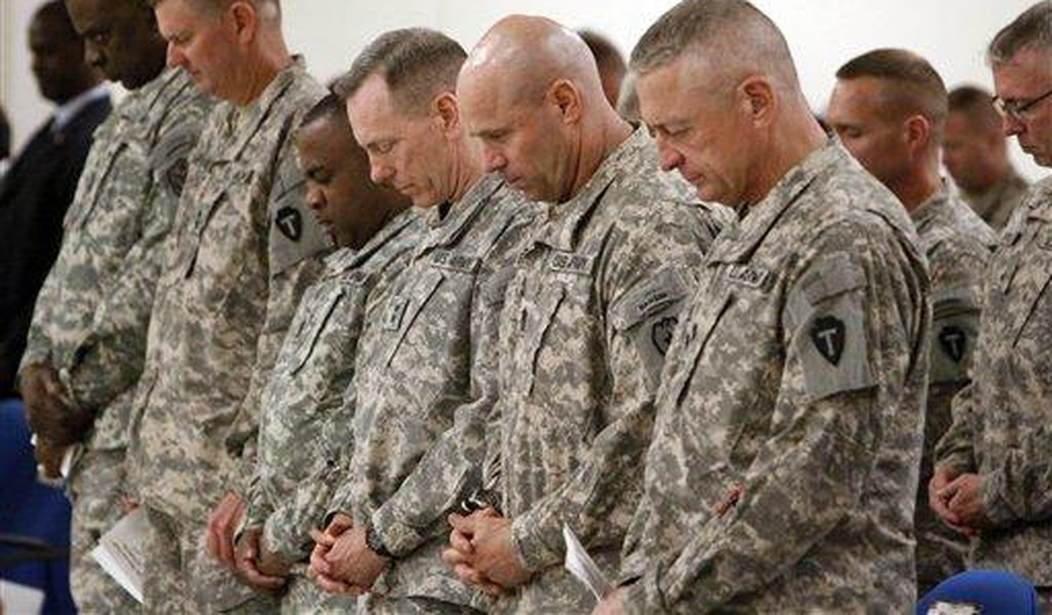The American military’s failure to reach its target recruiting goals has been an obvious and ongoing problem for a couple of years now. That’s particularly true in the Army, which missed the target by a full 25% last year. But a new program that was recently introduced seems to be providing at least some relief. Applicants who either fail the academic test or fall short of the physical standards are being offered the opportunity to enter a “prep course” where they can study and/or work out so they will be able to pass on the next try. This AP report highlights how the process worked for Daysia Holiday, who failed the academic test three times and was rejected for service. But after going through the preparatory classes, she passed and recently graduated from basic training.
Last August, Daysia Holiday decided to try one more time to join the Army.
She’d taken the academic test and failed three times. So, when she was offered a slot in a new Army prep course to help improve her scores and qualify for basic training, she jumped at the chance.
Seven months later, Pvt. 2nd Class Holiday is a proud graduate of Army basic training, and is finishing her advanced instruction at Fort Lee, Virginia, to become a power generation specialist who will maintain engines and other equipment for the service.
Some might argue that this is another case of the military lowering its standards and accepting unqualified applicants just to meet its recruiting goals, but I don’t see it that way. Not everyone excels at school work, but if they are willing to put in the extra effort to get up to speed, why not give them a shot? It’s really no different than parents hiring a tutor to help their children max out their standardized testing scores.
In the case of physical shortcomings, there will always be some interested applicants who won’t be able to make the cut. But the military has fewer young people to pick from these days. One study last fall found that 77% of high school graduates were too obese or otherwise out of shape to be accepted for basic training. But just as with the academic exam, if they are willing to put the work in and get in shape, they should definitely be given another chance.
Unfortunately, these aren’t the only issues plaguing the army in terms of recruitment. There are simply fewer young people willing to sign up and in a measurable number of cases it has been because of the American military’s new woke policies. In recent testimony, veterans have told Congress that woke policies are creating what’s being described as a once-in-a-generation recruiting crisis. (Free Beacon)
America is facing a “once in a generation military recruitment crisis” due to the Pentagon’s focus on woke priorities that are dividing the nation’s fighting force and leaving it unprepared for a conflict with China, an expert panel of military veterans warned Congress on Tuesday.
“Our military is facing the worst recruitment challenge since the advent of the all-volunteer force following the Vietnam war,” Jeremy Hunt, a former Army captain and chairman of the Veterans on Duty advocacy group, told Congress during a hearing on military readiness. “We stand amid a once-in-a-generation military recruitment crisis.”
The Army continues to deny this is happening, but these veterans aren’t buying the company line. They brought up mandatory Critical Race Theory training, 11-week resident DEI training classes, and the “correct use of pronouns.” Word gets around fast, and some of the young people who might otherwise enlist don’t really recognize this as the American Army they’ve traditionally heard about. Existing troops are also bailing out instead of signing up for another hitch as a result.
One veteran who testified said that the new woke culture in the Army has “left our military unfocused, untrained, unmanned, and unprepared for combat.” That’s a rather stinging indictment coming from someone who experienced it from the inside. If the army really wants to meet its recruiting goals, the “second chance” prep program is a good start. But going back to running the army like a traditional fighting force instead of a sensitivity studies course at Berkeley might do a lot more.








